- Home
- Anne O'Brien
A Tapestry of Treason Page 2
A Tapestry of Treason Read online
Page 2
I could not be so dispassionate. ‘Cousin Richard has opened the doors of power for us. It will not be to our advantage for that power to be threatened.’
The Friar’s uneasy prediction was not what I had wanted to hear. We had been given a warning, enough to get under the skin like a winter itch.
‘Do you want my prophecy, sister?’ Edward was irresponsibly confident. ‘Without any need for golden dice, I say all will be well. I say we will return from Ireland with music and rejoicing. To whom will Richard apportion land in Ireland once it has fallen to him? I doubt we will be overlooked.’
‘And our authority will be greater than ever,’ Thomas concurred. ‘Let’s get out of here and find some good company.’
Edward punched Dickon on the shoulder. ‘And if we see a raven nesting near a grey forest, we set Dickon here to kill it.’
We laughed. Our tame soothsayer was indeed a mountebank, yet a discomfort remained with me beneath the laughter. Friar John had been disturbed. It had been no deliberately false reading. And to what purpose would it have been, to prophesy unrest and upheaval? There had been terror in his flight.
I scooped up the dice that the magician had left behind, before Edward could take possession. Out of cursory interest, I threw them, without skill. A three and then, a moment later as the second die fell, a two. The three overcome by the two. A warning? But to whom? I had no power to read the future.
I kept in step with Edward and Dickon as we strolled back to the Court festivities where the practised voices of the minstrels could be heard in enthusiastic harmony.
‘Did you learn what it was that you wished to learn?’ Edward asked.
I avoided his speculative glance. ‘I do not know that I wished to learn anything.’
‘Oh, I think you did. It was not merely a frivolous entertainment, was it? It was all your idea.’
I smiled, offering nothing, uncomfortable at his reading of my intention. I had learned nothing for my peace of mind but I would keep my own counsel, Edward being too keen to use information, even that given privately, to further his own ends. Not that there was anything for me to admit. As a family we were at the supreme apex of our powers. I merely wished to know that it would stay that way. Now I was unsure.
‘Give me the dice,’ Edward said, holding out his hand.
‘I will not,’ I replied, ‘since you have no belief in their efficacy.’
I would keep them. I abandoned my brothers when Edward lingered to demonstrate for Dickon a particular attack and feint with an imaginary sword, their breathless shouts and thud of feet gradually fading behind me.
Thomas had not waited for me.
Since there was nothing new in this, it barely caught my attention.
* * *
Early June 1399: Westminster Palace
* * *
At last the campaign was under way; King Richard was leaving for Ireland where he would land in Waterford and impose English rule on the recalcitrant tribes. It was an auspicious day, and as if Richard had summoned God’s blessing, jewels and armour and horse-harness glittered and gleamed in the full brightness of a cloudless sun. An accommodating breeze lifted the banners of the magnates who accompanied him so that the appliquéd motifs and heraldic goldwork rippled and danced. As did my heart, rejoicing at this creation of majesty on the move, as I stood on the waterfront to bid them farewell and Godspeed. Richard’s previous invasion, four years earlier, had not ended on a sanguine note, the settlement collapsing as soon as the English King’s back was turned. This time Richard’s foray would bring lasting glory to England.
‘I should be going with them.’ Dickon’s mood was not joyful.
‘Next time I expect you will.’
‘I am of an age to be there.’
He was of an age, at almost fifteen years, even if he had not yet attained the height and breadth of shoulder that made his brother so impressive a figure on the tilting ground or in a Court procession. One day he would be so; one day he might even achieve some coordination of thought and action. But even though that day was still far off, Dickon should have been a squire, riding in his lord’s entourage. Comparisons on all sides did nothing but intensify his dissatisfaction with life. Brother Edward had been knighted by King Richard at the ridiculously young age of four years. Yet here was Dickon, without patronage, without recognition, a mere observer in the courtly crowd. What could I say to make him feel better about his lot in life? There were things no one talked of in our family.
‘Enjoy this grand moment of celebration,’ was all I could offer. ‘You’ll get the chance to go to war soon enough.’
I understood the grinding need in him to make a mark on the world, to make a name for himself, even as it baffled me that men were so keen to go into battle and risk their lives.
‘Talk to the King, Con. Ask him to take me as one of his household. Or even Edward.’
I shook my head. It was too late. No one had in mind a younger son with shadows surrounding his birth. Instead I pinioned Dickon to my side. There was much to be enjoyed in the image of royal power set out before us, the walls of Westminster Palace providing a stately if austere backdrop. This would be the campaign to coat King Richard’s glory in even more layers of gold. The horses, commandeered from the monastic houses of England, glowed with well-burnished flesh. A dozen great lords paraded their own wealth and consequence. And then came a large household of knights, of bishops and chaplains, even foreign visitors who accompanied the King with dreams of victory.
King Richard stood at the centre of this Court of his creating. Clad in eye-catching red, his most favoured colour, his bright hair curling beneath his brimmed hat, he drew every eye. The knowledge that he had made his will was thought to be no detriment to the success of this venture, nor that his holy relics and regalia were packed up to accompany him. Now he raised his hand in farewell, so that we might admire the ring that blazed red fire from a ruby that he had once granted to the Abbot and monks of Westminster, on condition that he could resume it when he left the country. Worth the vast sum of one thousand marks, the gem once more graced his hand as he mounted and took his place in the procession.
The forthcoming victory, as predicted by the golden dice, would shower us, the royal cousins, with even greater power. King Richard smiled on us, his hands open with generosity. And how important we were to the whole enterprise. My brother Edward, Duke of Aumale, fair and well-favoured, riding at the King’s side, noted by all as the King’s most beloved companion. Then came Thomas Despenser, my husband, Earl of Gloucester, in comparison dark and sallow-skinned, one of the inner circle of Richard’s friends and companions. Two of the Holland connection, John and Thomas Holland, the Dukes of Exeter and Surrey, joined to us through my father’s recent marriage to Joan Holland, rode in close company, forming a buttress around our King.
We had not always been so ostentatiously dominant. Until Richard’s reign we had wallowed in obscurity, thanks to my grandfather King Edward the Third. My father might be his fourth surviving son, thus rich in Plantagenet blood, but he had been much neglected in the handing out of titles and land and royal office. It was not until Richard became King that my father was created Duke of York. Until then he had been simply Earl of Cambridge, poorly endowed, without the estates and wealth appropriate to an earldom. He might have hoped for an endowment from marriage to an English heiress, but instead my grandfather saddled him with Isabella, who, foreign and disinherited, brought no dowry.
Nor was my father blameless, doing little to remedy his lack. With no noticeable ability in military ventures to bring home a fortune in ransoms, with no interest in the manoeuvrings of the Royal Court, my father did not shine on the political stage. He had no ambition, but we, his children, who would inherit these meagre offerings, were driven from the earliest age by naked desire to match our influence to our royal blood.
How superbly successful we had been. We were now power personified, for with the titles had come land and castles, vast est
ates and the wealth of gold coin from royal patronage, all these recent ennoblements bestowed by King Richard himself. To whom did the King turn when he needed advice? To Edward and Thomas. With whom did King Richard converse at royal masques when the child-Queen Isabelle grew weary? With me, the newly created Countess of Gloucester. We were the bedrock on which Richard’s power rested, the foundation and fortifications of England. We were pre-eminent, holding dominion within our new lands, and we would serve Richard well. It might not be for me to own political influence, a woman in a world where decisions were in the hands of men, but the promotion of my family was strong in my heart.
‘The King makes a brave show. Pray God the Irish are impressed.’
A laconic comment from the man at my side; stooped with years, his face seamed with unpleasant experience, my father and the King’s uncle, Edmund Duke of York. He was to be left behind in England to uphold firm government in Richard’s name as Keeper of the Realm. Another golden stitch in the tapestry of our value to the King.
I nodded, watching the pattern of the final leave-taking as Richard consigned his wife into the care of her ladies-in-waiting; Edward bid farewell to his wife Philippa with a gesture of the rich folds of his chaperon, intent primarily on catching the interest of the crowd with his smile and his handsome flamboyance. As for Thomas, he managed a brusque inclination of his head which might have been in my direction. Dickon had taken himself off to who knew where. My father, without a word, abandoned his young wife Joan at my side when summoned by the King to receive some final instruction. Joan, now alone, made no attempt to converse with me. Likewise, I had nothing to say to her.
All told, the day had been an exhibition of absence of familial affection. Fortunately, we were bound fast together by raw ambition.
Chapter Two
31st August 1399: Palace of Westminster
* * *
‘If you are going to keep me company, I could wish you would not fidget.’
Two months. Two short months during which all the glamour of King Richard’s departure had collapsed into disaster. I could make no pretence that my mood was anything but heavy, unease sharpening my tongue. Indeed it was not an unease; by now it was rampant fear. If Dickon expected tolerance from me he would see the day pass without even a gnat-bite of it. I was held in chains of a grave anxiety.
We were still suffering the sultriness of high summer, but the heat did not penetrate to where we stood, Dickon and I, carved emblems of royal power pressing down upon us from above, enfolding us from left and right, from every angle. Such symbols of royal authority, King Richard’s authority, should have soothed and reassured. I frowned and Dickon continued to twitch and shuffle, a mess of angular limbs.
‘How can I not fidget? How long have we been waiting? You don’t even know that he will be brought here.’
‘I do know. He will come.’
‘There are twenty-six of them,’ Dickon informed me inconsequentially, squinting at the angelic band of heavenly angels, carved at the end of each hammer-beam above our heads. He had been passing the time in mindless counting, but I was not prepared to engage in ineffectual conversation. It seemed to me that my family and I were balanced like angels on the head of a pin. All we had achieved was about to be thrown into chaos.
‘How much longer?’ Dickon groaned. ‘Will he be shackled?’
When his large feet continued to scuff against the Purbeck stone, his shoulders hunched in a perpetual slouch, I pinned him with a stare of displeasure as I dug my fingers into the fine weave of his sleeve. I cared not that it was detrimental to the raised pattern.
‘Whether he is shackled or not, you will award him all courtesy. He is your godfather as well as your King.’
‘And the only source of any wealth that will come to me. I will be all courtesy, as douce as a girl, because if I’m not I’ll be cut off without a silver groat.’ Dickon’s glance was sharper and more calculating than it had a right to be. ‘Except that he may no longer have any groats to lavish on me. Will he be a prisoner?’ Dragging his sleeve from my grasp, he moved so that he could see through the carved arch of the doorway where they would eventually make an entrance.
‘I do not yet know.’
But I could not see this charade, this exchange of power from King to Invader, ending in any other fashion.
A servant entered, one I had sent on a mission, now hot from riding. He approached at a jog.
‘Well?’ I asked.
‘They are here, my lady, two miles outside the city.’ He bowed then wiped his face on his sleeve. ‘They’ll be closer now. The King is here with them.’
‘Who is in command?’
The servant shrugged. He was not one of mine or he would not have dared to shrug in my presence. ‘The Mayor and aldermen have met with them, my lady. It was their decision that the King should be brought here to Westminster. The King had no choice in the matter, I’d say.’
‘And the Duke of Lancaster?’
‘He rides at the head of his army, my lady.’
‘Is he in control? Does he have an air of authority?’ I was curious. What was the demeanour of my cousin Henry of Lancaster? Had he returned as supplicant or conqueror?
Richard had banished Henry from England, ostensibly for treason. Now Henry was returned on the death of his father, to reclaim both his title and his inheritance, choosing the opportune moment when Richard was in Ireland. I had to admire his perspicacity. Many would say that Richard had been far from wise in condemning Henry to banishment for life at the same time as he confiscated all the Lancaster wealth and lands for his own use. Our cousin Henry was unlikely to accept such wilful destruction of his true inheritance with a head bent in obedient acceptance. Cousin Henry would demand what was his by right. He had landed at Ravenspur to the north in the first week of July, collecting an army which included the puissant Percy Earl of Northumberland, and now he was here in London with King Richard firmly tucked into his gauntleted fist.
The messenger broke into my thoughts. ‘The Duke of Lancaster’s armour is very fine, my lady. Italian and worth a King’s ransom, so they say. He looks like a man who knows what he wants and intends to get it.’ His face split in a wily gap-toothed grin. ‘There’ll be much changing of allegiances, I reckon, now that the King is under Lancaster’s heel.’
Heel or fist, the result could be the same. Disliking his humour, I dismissed him without further coin than I had already given. King Richard’s crown was under threat, but we would wait until all was made clear. Dickon drifted away again.
‘Do you know what I think…?’ he called across the vast echoing space.
I was never to know. The repetitive beat of marching feet intruded, the clatter of horses’ hooves, and not least the rancorous shouts of the crowd. My sole concentration was focused on the great doors, now dragged back, stirring the air. In marched an armed guard; at the centre of their protection, or perhaps their containment, walked Richard. King Richard, heir of King Edward the Third, our cousin and God’s anointed King of England, all hedged about by bland-faced soldiery. In the face of such military might, Dickon and I retreated once again to the feet of a carved and unimpressed statue.
The guard came to a halt and so did the King.
I could not take my eyes from his face. Never had I seen him so unkingly, whether in demeanour or in apparel. Pale, dishevelled, his soft lips pressed hard together, Richard stared round him as if he had still to accept where he was and why he was here, hemmed in by soldiers not in his own livery. Then he was plucking at his tunic, a garment that he might have been wearing for the whole of the journey from Wales, so travel-worn and stained as it was. His boots were covered in dust, as were his hose to the knee. Eyes wild and uncomprehending, he was hollow-cheeked, implying that he had not eaten a good meal since he had fallen into Lancaster’s hands. This man was so much changed from the crimson-clad ruler who had left London a mere few weeks ago that all I could register in that moment was shock. His youthful beauty and vi
brancy had been beaten out of him. Even his hair visible beneath the plain felt cap had lost its lustre. He wore no jewels. The ruby ring had gone from his hand. There was no sword at his side. Degradation, as rank water in a thunderstorm, dripped from him.
Richard’s vacant gaze fell on me, so that I stepped forward and, through a lifetime of duty and custom, curtsied. The King might have been robbed of all royal grace, but I, clad nobly in deep blue damask with gold stitching at cuff and hem, would uphold it for him. We owed him so much. Was he not my own cousin, my own Plantagenet blood? Unfortunately so was Henry of Lancaster. As I rose to my full height, I foresaw a complex future, troubled by bonds of conflicting family loyalties.
At a glance from me, Dickon bowed.
‘Constance?’ The King’s voice trembled.
‘Yes, my lord.’
‘Have you come to petition me?’ His tone was querulous.
‘No, my lord.’
I was distracted, for into the Hall had marched an escort in livery that was my own by birth, the same lions and French lilies as were carved onto Richard’s shields, and then came the Mayor and aldermen, self-important in their red robes despite having walked the distance from their first meeting with the King. It was the man at the head who was in command, a man who once had the height and bearing to be an imposing figure. Now his hair was grey, his face marked by years, his shoulders no longer braced beneath the armour plating. My father, Edmund of Langley, Duke of York.
‘My lord.’
I curtsied dutifully again. He nodded to me, ignoring Dickon, concentrating on dealing with the immediate problem.
‘Take the King to his chamber,’ he directed his serjeant-at-arms. ‘See to his comfort there, but post a permanent guard at door and window. We need no more attempts at escape as at Lichfield.’
I thought that Richard, standing silent and unresponsive in our midst, would not have the wit to escape. The Mayor nodding his approval, we watched as the King, with a light touch to his arm, was led unresisting, uncomplaining, away in the direction of the royal apartments.

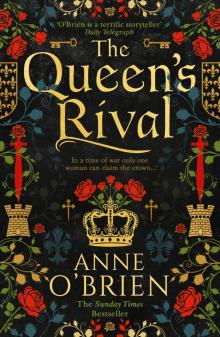 The Queen's Rival
The Queen's Rival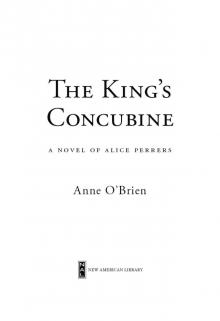 The King’s Concubine: A Novel of Alice Perrers
The King’s Concubine: A Novel of Alice Perrers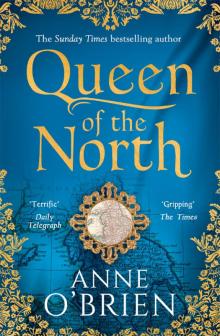 Queen of the North
Queen of the North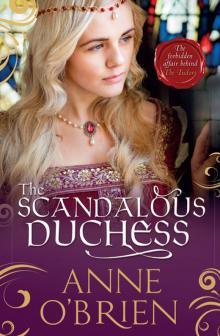 The Scandalous Duchess
The Scandalous Duchess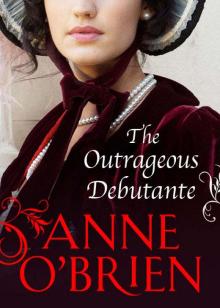 The Outrageous Debutante
The Outrageous Debutante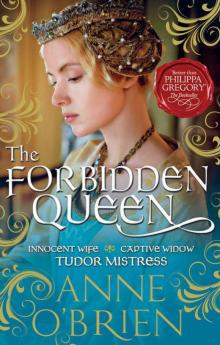 The Forbidden Queen
The Forbidden Queen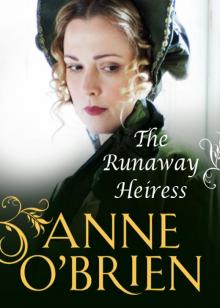 The Runaway Heiress
The Runaway Heiress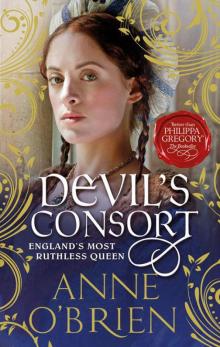 Devil's Consort
Devil's Consort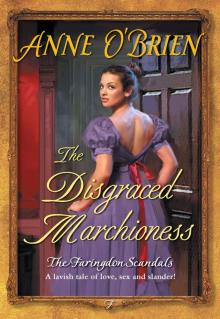 The Disgraced Marchioness
The Disgraced Marchioness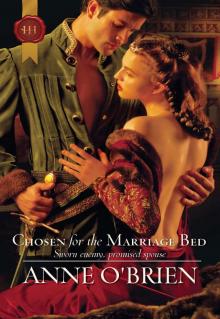 Chosen for the Marriage Bed
Chosen for the Marriage Bed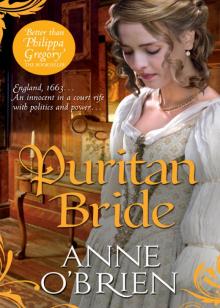 Puritan Bride
Puritan Bride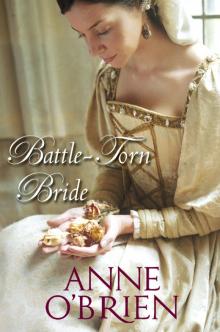 Battle-Torn Bride
Battle-Torn Bride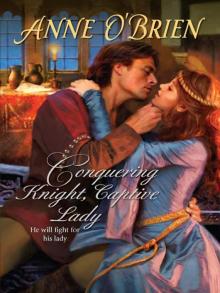 Conquering Knight,Captive Lady
Conquering Knight,Captive Lady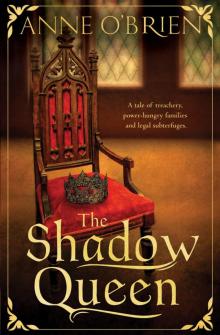 The Shadow Queen
The Shadow Queen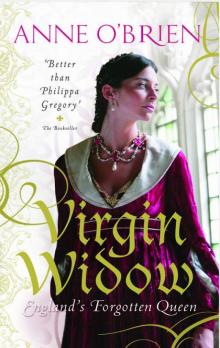 Virgin Widow
Virgin Widow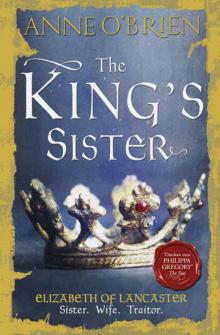 The King’s Sister
The King’s Sister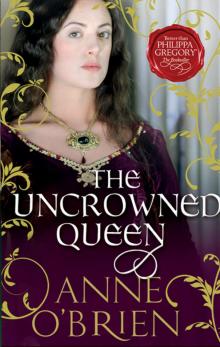 The Uncrowned Queen
The Uncrowned Queen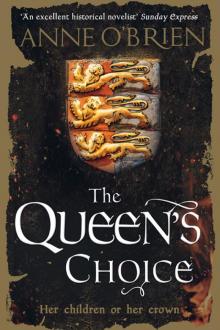 The Queen's Choice
The Queen's Choice